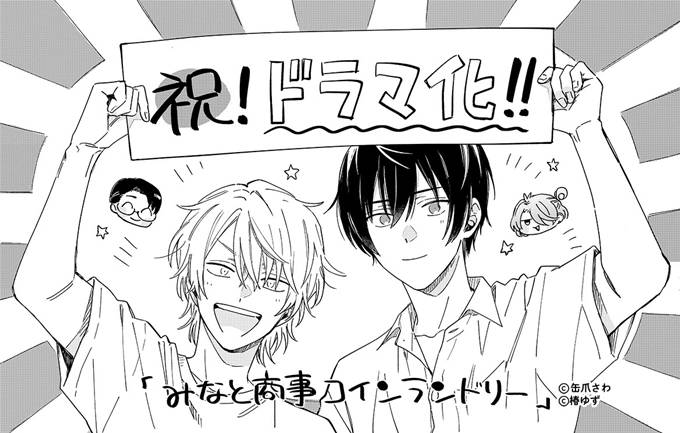On ComicK, Minato Shouji Coin Laundry has drawn readers into a quiet, sunlit world where a small laundromat becomes the backdrop for a romance that is both tender and complicated. At first glance, it’s a slice-of-life story about a man who trades the corporate grind for a slower pace. But just like freshly laundered clothes, the surface simplicity hides deeper creases ones shaped by longing, secrecy, and the weight of personal history.
The series invites us to step inside Akira Minato’s inherited laundromat, where the hum of machines and the scent of detergent mix with awkward glances and hesitant conversations. The first meeting between Minato and a young high schooler, Shintaro Katsuki, sets the tone for a relationship that teeters between heartwarming and troubling. This isn’t a love story told in bold declarations; it’s one that lingers in silences, in half-finished sentences, and in the quiet courage it takes to be honest.
What keeps readers hooked is not just the romance, but the questions it raises about age, boundaries, and the blurry line between companionship and desire.
Akira Minato: A Man Seeking Simplicity, Finding Complexity
Akira Minato’s journey begins with a desire to step away from stress. The laundromat he inherits from his grandfather seems like a promise of rest: a place where days pass at their own pace, and the most pressing decisions involve folding towels or fixing a stubborn dryer. Yet this vision of peace is disrupted almost immediately by Shintaro’s arrival.
Minato is not written as a typical romantic lead he is cautious, guarded, and painfully aware of the social consequences of his feelings. His attraction to Shintaro is an internal conflict he can’t entirely silence, and that restraint becomes one of the series’ central tensions. Minato’s perspective is deeply human; he knows what he feels, but he also knows the complications that come with it.
Through Minato, the story captures the experience of someone trying to balance personal truth with moral responsibility. His laundromat may be a place for washing away stains, but some emotions aren’t so easily cleaned.

Shintaro Katsuki: Youthful Energy with an Unshakable Focus
Shintaro is the kind of character who walks into a scene and changes its rhythm entirely. His youth, openness, and determination to connect with Minato create a dynamic that is both charming and disarming. For Shintaro, the laundromat isn’t just a chore it’s an escape from the noise of a big family, a space where he can be seen as an individual.
What makes Shintaro compelling is his persistence. He doesn’t let Minato’s hesitations deter him, and his straightforward approach contrasts sharply with Minato’s careful self-control. While his feelings are never explicitly manipulative, there’s an undeniable power imbalance in their interactions one that the story doesn’t shy away from showing.
Shintaro’s role in the narrative pushes both himself and Minato into situations that test the boundaries of comfort, making their relationship as much about self-discovery as it is about romance.
The Laundromat: More Than Just a Setting?
With its place in the title, one might expect the laundromat to serve as a symbolic anchor for Minato’s transformation. In some ways, it does the warmth of sunlight through the front windows, the steady whir of machines, the quiet moments between customers all contribute to the story’s atmosphere. It’s a space where two people from different worlds meet and start to blur the lines between them.
However, as the story progresses, the laundromat sometimes fades into the background, becoming more of a meeting point than a character in its own right. This choice is both surprising and a little disappointing, given its potential to reflect themes of renewal, cycles, and cleansing. The few scenes that explore Minato’s connection to his grandfather or his interactions with customers hint at a richer narrative thread that could have been developed further.
Still, when the laundromat is present, it carries a subtle intimacy. It’s a public space that somehow feels private mirroring the delicate, almost secretive nature of Minato and Shintaro’s growing bond.
Romance and Boundaries: Walking a Fine Line
The heart of Minato Shouji Coin Laundry lies in its age gap romance, a theme that inevitably invites scrutiny. Minato’s thirty years stand in stark contrast to Shintaro’s seventeen, and the manga doesn’t ignore the discomfort this might cause some readers. Minato himself struggles with the appropriateness of his feelings, often pulling away even as he’s drawn closer.
This tug-of-war between desire and restraint is where the emotional tension thrives. It’s not just about whether they can be together, but whether they should. The narrative explores how attraction can exist alongside a deep awareness of its implications, creating a romance that is as much about hesitation as it is about pursuit.
While some readers may find the focus on age gap relationships unsettling especially given hints from Minato’s own past the story uses this discomfort to ask larger questions about love, agency, and the ethics of emotional connection.

Art and Atmosphere Soft Lines, Sharp Emotions
Visually, Minato Shouji Coin Laundry is a warm, inviting experience. The art style favors soft lines, gentle shading, and expressive faces that can communicate entire conversations without a single word of dialogue. This tenderness in the art contrasts with the tension in the story, creating a push-pull effect that draws readers in.
The laundromat scenes often feel bathed in natural light, giving them a calm, almost nostalgic tone. Yet in moments of emotional strain like an unguarded confession or a prolonged glance the panels narrow, the focus sharpens, and you feel the shift in atmosphere.
This careful use of visual storytelling adds weight to the romance, making even small gestures like a hand brushing against another carry significance. The result is a story where the art and narrative work together to make every interaction feel layered.
Conclusion A Romance That Washes Over You, Complications and All
Minato Shouji Coin Laundry is not a simple love story. It’s a delicate, sometimes uneasy exploration of how attraction, secrecy, and circumstance can intertwine in ways that challenge our comfort zones. For ComicK readers, it offers a slow-burn romance wrapped in warm aesthetics, yet layered with moral complexity.
While not every narrative choice lands perfectly especially the underuse of the laundromat as a deeper metaphor the series succeeds in creating characters you want to understand, even when you don’t agree with their choices. It’s tender, troubled, and deeply human qualities that, like life itself, refuse to be neatly folded.
